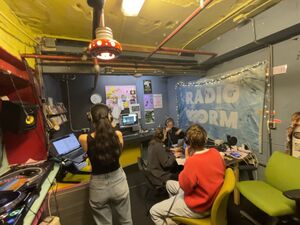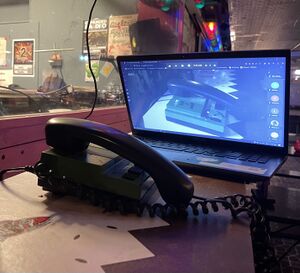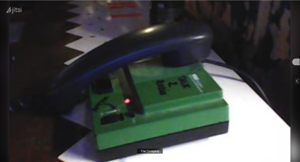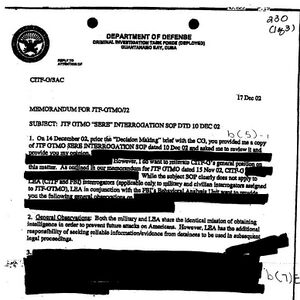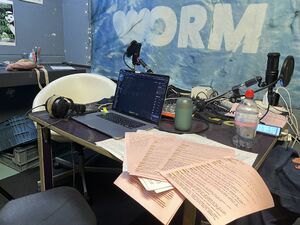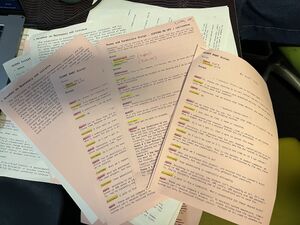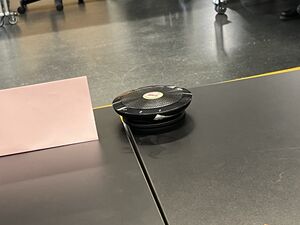Week 5 Protocols For Bad Customer Service: Difference between revisions
(→Setup) |
|||
| (7 intermediate revisions by the same user not shown) | |||
| Line 1: | Line 1: | ||
'''Radio Worm - Protocols for Collective Performance - Week 5:''' | '''Radio Worm - Protocols for Collective Performance - Week 5:''' | ||
Claudio Wyn Fred Charlie Eleni Zuhui | Claudio Wyn Fred Charlie Eleni Zuhui | ||
{| width=90% align=center | |||
|<pre style=" background:#D5FFAC; color:black;"> | |||
In this week's radio performance, we use protocols —those rules and procedures commonly found in bureaucratic and corporate systems— as a central theme. | |||
</pre> | |||
|} | |||
=Setup= | =Setup= | ||
[[File:Week5 radio setup.jpg|thumb|right|Performance setup | [[File:Week5 radio setup.jpg|thumb|right|Performance setup]] | ||
{|align=right | {|align=right | ||
|[[File:Week5 radio phone.jpg|thumb|right| | |[[File:Week5 radio phone.jpg|thumb|right|A phone at WORM, being broadcasted through jitsi]] | ||
|[[File:Week5 radio phone1.jpg.png|thumb|right| | |[[File:Week5 radio phone1.jpg.png|thumb|right|A phone at WORM, being broadcasted through jitsi]] | ||
|} | |} | ||
=== 1.1 Prototype === | |||
This radio show tried to explore the power dynamics in call center systems through a series of role-play conversations. It inspired by Sound Jamming (VCV Rack!!), we had a role play in last show, and has different standpoints while our group member read the interview, leading us to rethink the relationship between language, identity, and system. The confusion and questions we encounter reflect the gaps between protocols and real human needs. The conversations, advertisements, and system responses emerge as layers of bureaucratic communication. | |||
During our group meeting, we were inspired by shared experiences with customer service. Since the theme of protocols was central to our discussion, we created a fictional call center to examine how language operates within systematic constraints. We wanted to explore how agents serve as mediators rather than power holders, caught between system limitations and customer needs. | |||
=== 1.2 Design === | |||
How can we reveal the power dynamics in automated systems? How do protocols shape human communication? How do we structure the tension between human needs and systematic responses? It reminds us of the concept of interpretative labor - agents must constantly interpret between rigid protocols and fluid human situations. The system transfers both problem-solving and emotional labor onto agents, who must absorb customer frustrations while lacking the agency to resolve systemic issues. | |||
We collected stories from Reddit and classic film scripts about call center experiences, creating four role-play scenarios that demonstrate this double bind, focusing primarily on the user's dilemma within the system. | |||
Sound Techniques: | |||
A. Role-play Dialogue | |||
Character development | |||
Emotional progression | |||
System interruptions | |||
B. Sound Elements | |||
TTS | |||
Lyric Jungle | |||
Hold music | |||
Phone call effect | |||
C. Narrative Structure | |||
Multiple scenarios | |||
Advertising breaks | |||
System messages | |||
D. Tension Building | |||
Growing frustration | |||
Protocol limitations | |||
Human-AI interaction | |||
==== 1.2.2 Material ==== | |||
We selected and adapted stories highlight the relationship between humans and automated systems. The dialogue serves as a backbone to explore how people are conditioned by machine expressions. | |||
The system sounds create an institutional atmosphere, expressing the cold, automated environment of call centers. | |||
Music and advertisements add ironic commentary on the commercialization of human interaction. | |||
==== 1.2.3 Sound Source(parts) ==== | |||
'''Role-play Scripts''' | |||
Four scenarios based on real experiences, showing how customers and agents navigate system constraints. | |||
'''Phone System Elements''' | |||
Automated messages, hold music, and system prompts that interrupt and shape human conversation. | |||
''' Fake Advertisements''' | |||
Inserted phone advertisements that highlight the human-AI relationship. | |||
=Protocols= | =Protocols= | ||
==Redaction protocol== | ==Redaction protocol== | ||
[[File:Redacteddoc4.jpeg|thumb|right]] | [[File:Redacteddoc4.jpeg|thumb|right]] | ||
<blockquote style="width: | <blockquote style="width: 55%;", "text-align: center;"> | ||
“Secrecy is another by-product of administrative power.<br> ''‘Every bureaucracy seeks to increase the superiority of the professionally informed by keeping their knowledge and intentions secret’'', wrote sociologist Max Weber. <br> | “Secrecy is another by-product of administrative power.<br><br> ''‘Every bureaucracy seeks to increase the superiority of the professionally informed by keeping their knowledge and intentions secret’'', wrote sociologist Max Weber. <br><br> | ||
Visual representations of ‘official secrets’—as Max Weber calls them—can be found in the form of redacted documents, both for legal, financial, or security purposes. A request for government documents can produce pages full of blacked-out lines, as if it was abstract art. The stupidity and irra- tionality of bureaucratic reasoning as someone within the adminis- tration painstakingly has to go over the text line by line, rendering information useless.” - CAPS LOCK, Ruben Pater | Visual representations of ‘official secrets’—as Max Weber calls them—can be found in the form of redacted documents, both for legal, financial, or security purposes. A request for government documents can produce pages full of blacked-out lines, as if it was abstract art. The stupidity and irra- tionality of bureaucratic reasoning as someone within the adminis- tration painstakingly has to go over the text line by line, rendering information useless.” - CAPS LOCK, Ruben Pater | ||
</blockquote> | </blockquote> | ||
| Line 60: | Line 91: | ||
<br> | <br> | ||
==Scripts== | ==Scripts== | ||
{|align=center | |||
|[[File:Week5 radio scripts.jpg|thumb]] | |||
|[[File:Week5 radio scrpts1.jpg|thumb]] | |||
|} | |||
==[[SI25 Week 5 Audio|Audio]]== | |||
▲All the audio files gathered and created for the show are here | |||
<br> | |||
<br> | |||
=Debrief= | =Debrief= | ||
[[File:Claudio ex machina.jpg|thumb|Claudio ex machina at the debrief]] | [[File:Claudio ex machina.jpg|thumb|Claudio ex machina at the debrief]] | ||
[https://pad.xpub.nl/p/20241021-radioworm05 The pad] | [https://pad.xpub.nl/p/20241021-radioworm05 The pad] | ||
Latest revision as of 14:46, 4 November 2024
Radio Worm - Protocols for Collective Performance - Week 5: Claudio Wyn Fred Charlie Eleni Zuhui
In this week's radio performance, we use protocols —those rules and procedures commonly found in bureaucratic and corporate systems— as a central theme. |
Setup
1.1 Prototype
This radio show tried to explore the power dynamics in call center systems through a series of role-play conversations. It inspired by Sound Jamming (VCV Rack!!), we had a role play in last show, and has different standpoints while our group member read the interview, leading us to rethink the relationship between language, identity, and system. The confusion and questions we encounter reflect the gaps between protocols and real human needs. The conversations, advertisements, and system responses emerge as layers of bureaucratic communication. During our group meeting, we were inspired by shared experiences with customer service. Since the theme of protocols was central to our discussion, we created a fictional call center to examine how language operates within systematic constraints. We wanted to explore how agents serve as mediators rather than power holders, caught between system limitations and customer needs.
1.2 Design
How can we reveal the power dynamics in automated systems? How do protocols shape human communication? How do we structure the tension between human needs and systematic responses? It reminds us of the concept of interpretative labor - agents must constantly interpret between rigid protocols and fluid human situations. The system transfers both problem-solving and emotional labor onto agents, who must absorb customer frustrations while lacking the agency to resolve systemic issues. We collected stories from Reddit and classic film scripts about call center experiences, creating four role-play scenarios that demonstrate this double bind, focusing primarily on the user's dilemma within the system.
Sound Techniques:
A. Role-play Dialogue
Character development
Emotional progression
System interruptions
B. Sound Elements
TTS
Lyric Jungle
Hold music
Phone call effect
C. Narrative Structure
Multiple scenarios
Advertising breaks
System messages
D. Tension Building
Growing frustration Protocol limitations Human-AI interaction
1.2.2 Material
We selected and adapted stories highlight the relationship between humans and automated systems. The dialogue serves as a backbone to explore how people are conditioned by machine expressions. The system sounds create an institutional atmosphere, expressing the cold, automated environment of call centers. Music and advertisements add ironic commentary on the commercialization of human interaction.
1.2.3 Sound Source(parts)
Role-play Scripts Four scenarios based on real experiences, showing how customers and agents navigate system constraints.
Phone System Elements Automated messages, hold music, and system prompts that interrupt and shape human conversation.
Fake Advertisements Inserted phone advertisements that highlight the human-AI relationship.
Protocols
Redaction protocol
“Secrecy is another by-product of administrative power.
‘Every bureaucracy seeks to increase the superiority of the professionally informed by keeping their knowledge and intentions secret’, wrote sociologist Max Weber.
Visual representations of ‘official secrets’—as Max Weber calls them—can be found in the form of redacted documents, both for legal, financial, or security purposes. A request for government documents can produce pages full of blacked-out lines, as if it was abstract art. The stupidity and irra- tionality of bureaucratic reasoning as someone within the adminis- tration painstakingly has to go over the text line by line, rendering information useless.” - CAPS LOCK, Ruben Pater
Protocol sheet
using the script of <CALL CENTER TRAINING: PROPER USE OF TONE OF VOICE & VOLUME>
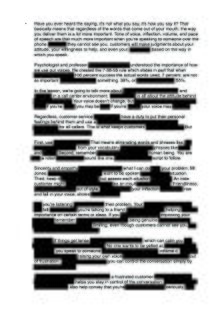
|
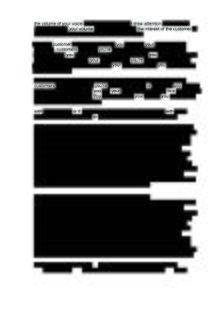
|
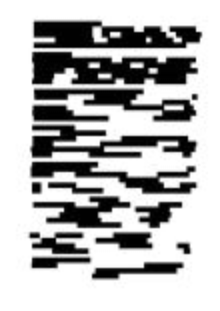
|

|
Terms and conditions protocol
Scripts
Audio
▲All the audio files gathered and created for the show are here

